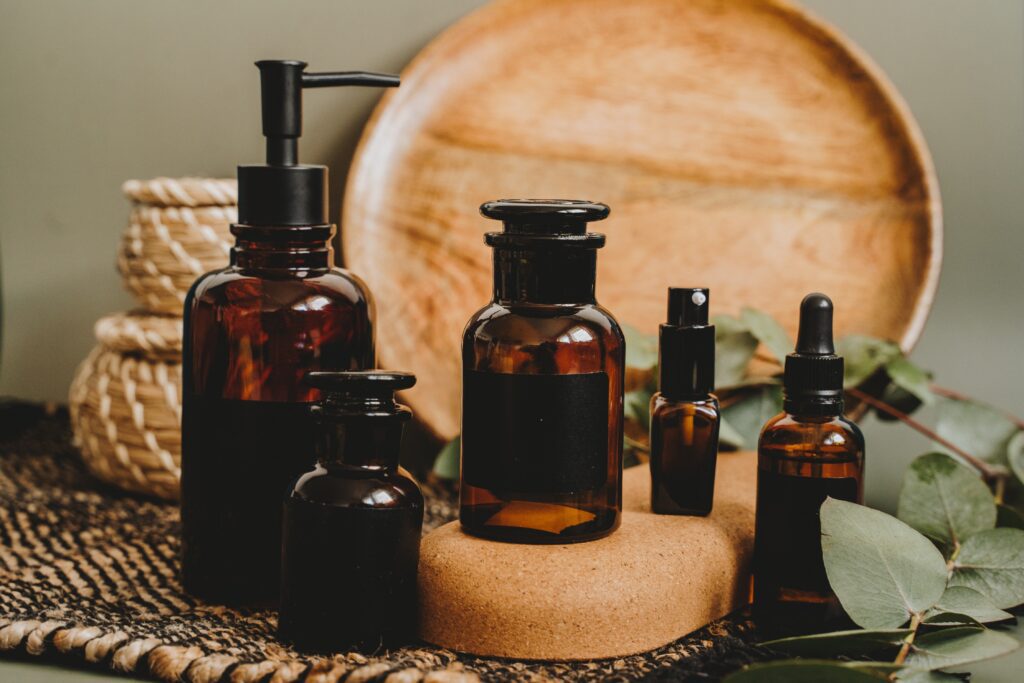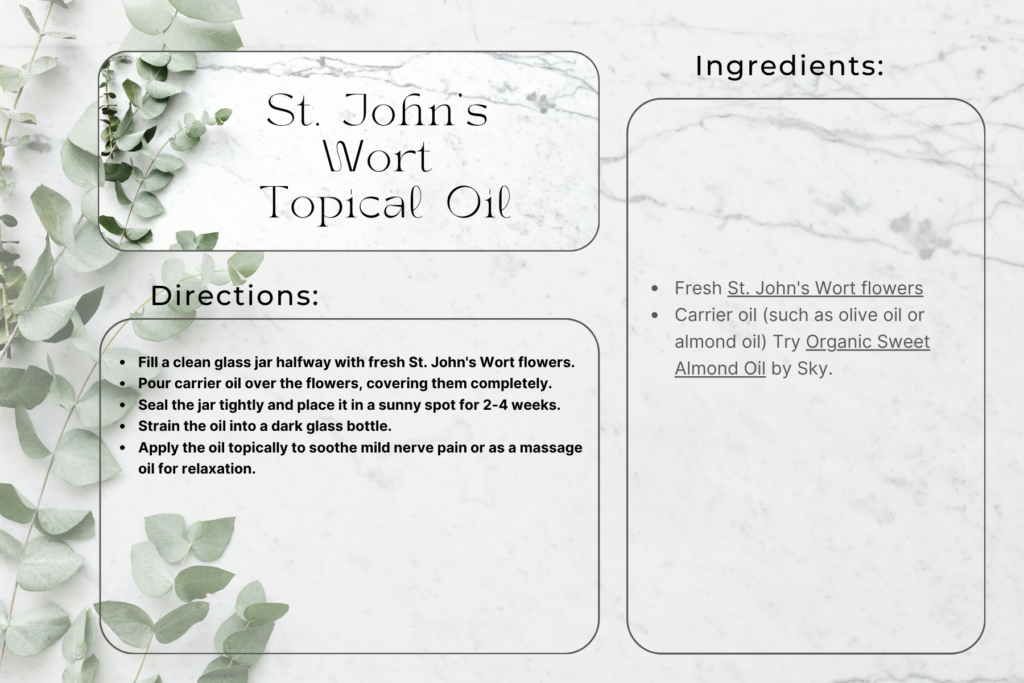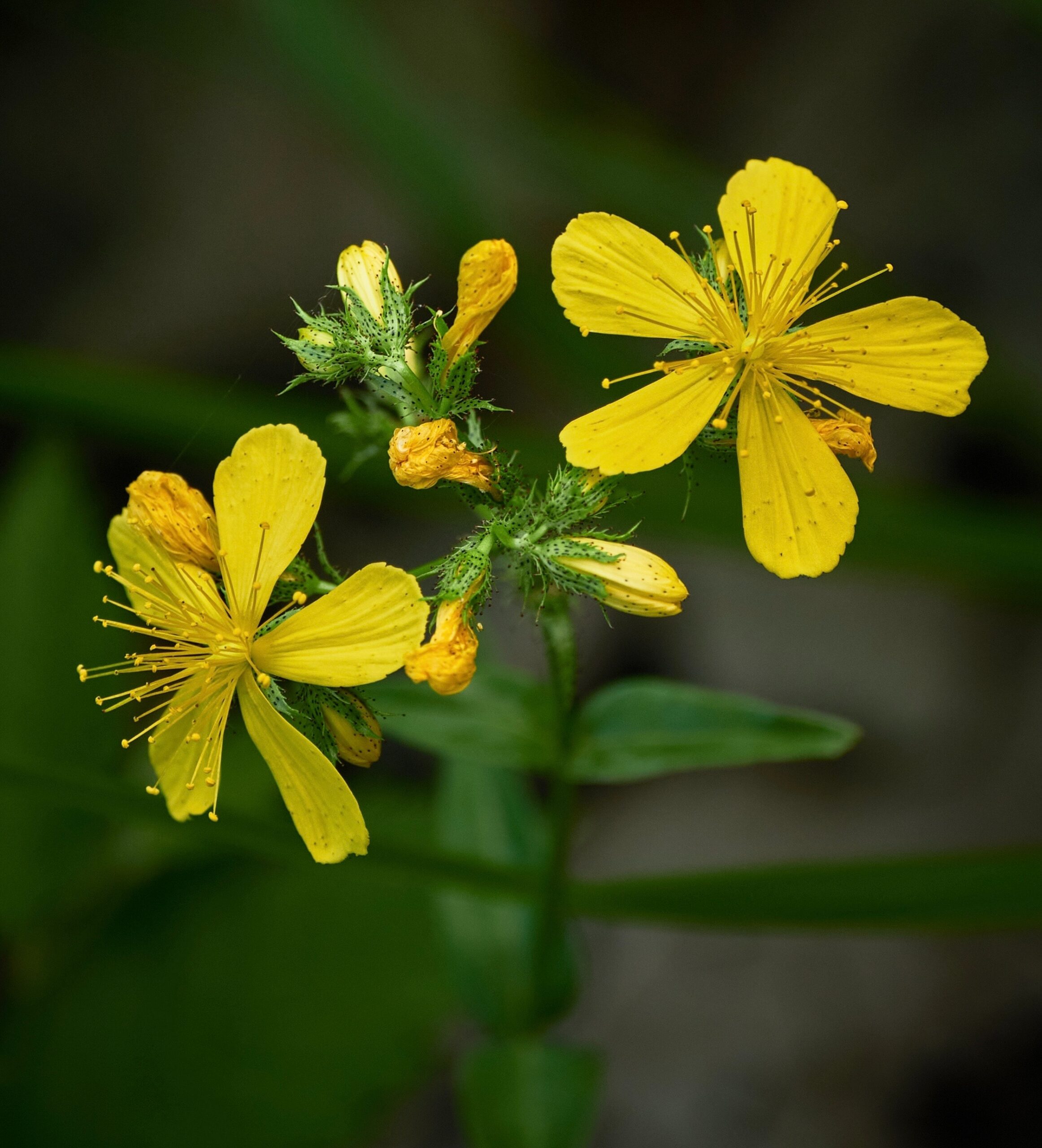St. John’s Wort Topical Oil
Ingredients:
- Fresh St. John’s Wort flowers
- Carrier oil (such as olive oil or almond oil) I use the Organic Sweet Almond Oil by Sky.

Instructions:
- Fill a clean glass jar halfway with fresh St. John’s Wort flowers.
- Pour carrier oil over the flowers, covering them completely.
Seal the jar tightly and place it in a sunny spot for 2-4 weeks. - Strain the oil into a dark glass bottle.
- Apply the oil topically to soothe mild nerve pain or as a massage oil for relaxation.
The History of St. John’s Wort
St. John’s wort (Hypericum perforatum) is a flowering plant that has a long history of use in traditional medicine. It is native to Europe but is also found in other parts of the world. The plant has been used for centuries for its medicinal properties, particularly for its potential effects on mood and mental health. The name “St. John’s wort” is believed to have originated from its traditional flowering around the feast day of St. John the Baptist on June 24th.
In ancient times, St. John’s wort was used for various purposes, including wound healing and as a remedy for various ailments. Its use for mood disorders and mental health dates back to ancient Greek and Roman civilizations. Over the years, St. John’s wort has remained a popular herbal remedy for addressing mild to moderate depression, anxiety and other mood-related conditions.
A Few Studies of Interest on St. John’s Wort:
The Benefits of St. John's Wort for the Human Body and Brain

St. John’s wort has been widely studied for its potential benefits, particularly for its effects on mood and mental health. However, it’s important to note that while some research supports its use, the evidence is mixed, and the effects can vary from person to person. Here are some potential benefits of St. John’s wort:
Mood Regulation: St. John’s wort is often used as a natural remedy for mild to moderate depression. It contains compounds that are believed to influence neurotransmitters such as serotonin, norepinephrine, and dopamine, which play a role in mood regulation.
Anxiety Reduction: Some studies suggest that St. John’s wort might have anxiolytic (anxiety-reducing) effects. It is thought to have a calming effect on the nervous system.
Neurotransmitter Modulation: St. John’s wort is believed to influence the levels of various neurotransmitters that are involved in mood and emotional well-being. This modulation could potentially benefit individuals with mood disorders.
Anti-Inflammatory Effects: Chronic inflammation has been linked to mood disorders and cognitive decline. St. John’s wort contains compounds with anti-inflammatory properties that could contribute to improved mental health.
Antioxidant Activity: St. John’s wort contains antioxidants that can help protect brain cells from oxidative stress, which is important for maintaining brain health.
Sleep Improvement: Sleep disturbances are common in individuals with mental dysregulations. St. John’s wort might have a mild sedative effect that could contribute to improved sleep quality.
With the whispered promise of addressing minor skin irritations, bruises, or muscle tension, St. John’s Wort Topical Oil invites you to unlock the potency of its bioactive compounds, as generations before have done. As the oil absorbs, envision a centuries-old connection between plant and humanity, encapsulated in this small vial. Allow yourself to embark on this ancient ritual, discovering the potential benefits of a herbal ally in the form of St. John’s Wort Topical Oil.
Caution to Consider
When using topical holistic tinctures, it’s important to exercise caution and consider a few key points. Firstly, while holistic tinctures are often considered safe, everyone’s skin reacts differently. It’s advisable to perform a patch test before applying a tincture to a larger area of skin to check for any adverse reactions or allergies.
Additionally, some herbs might interact with certain medications, so if you’re taking medications, it’s wise to consult with a healthcare professional before using topical tinctures. If you experience any irritation, redness, or discomfort after applying a tincture, discontinue use immediately. Pregnant or breastfeeding individuals should also consult with a healthcare provider before using topical tinctures, as certain herbs might not be safe during these times. Remember that holistic tinctures are potent extracts, so a little goes a long way. Always follow the recommended usage guidelines provided with the tincture.
Note: It’s essential to consult with your healthcare provider before making significant changes to your wellness program, especially if you have specific health concerns or restrictions. Your health and happiness are our top priorities.
Disclaimer: The information and/or products mentioned in this article are provided as information resources only and are not to be used or relied on to diagnose, treat, cure or prevent any disease. The statements made in this article have not been evaluated by the Food and Drug Administration. Any products mentioned are not intended to diagnose, treat, cure, or prevent any disease, but rather to be considered as an informational resource only to encourage critical thinking and personal research. The information in this article is intended for educational purposes only. The information is not intended to replace medical advice offered by licensed medical physicians. Please consult your doctor or health care practitioner for any and all medical advice.






